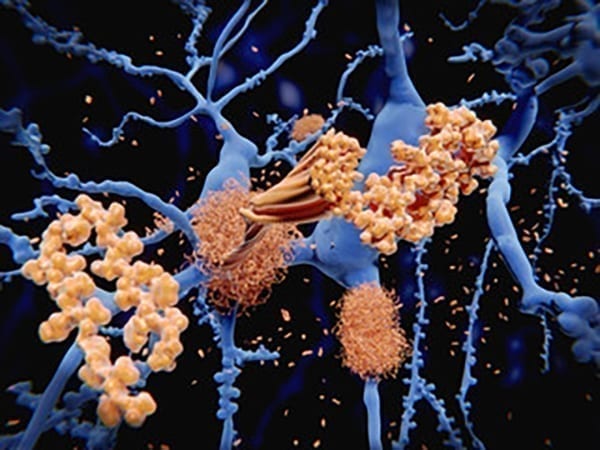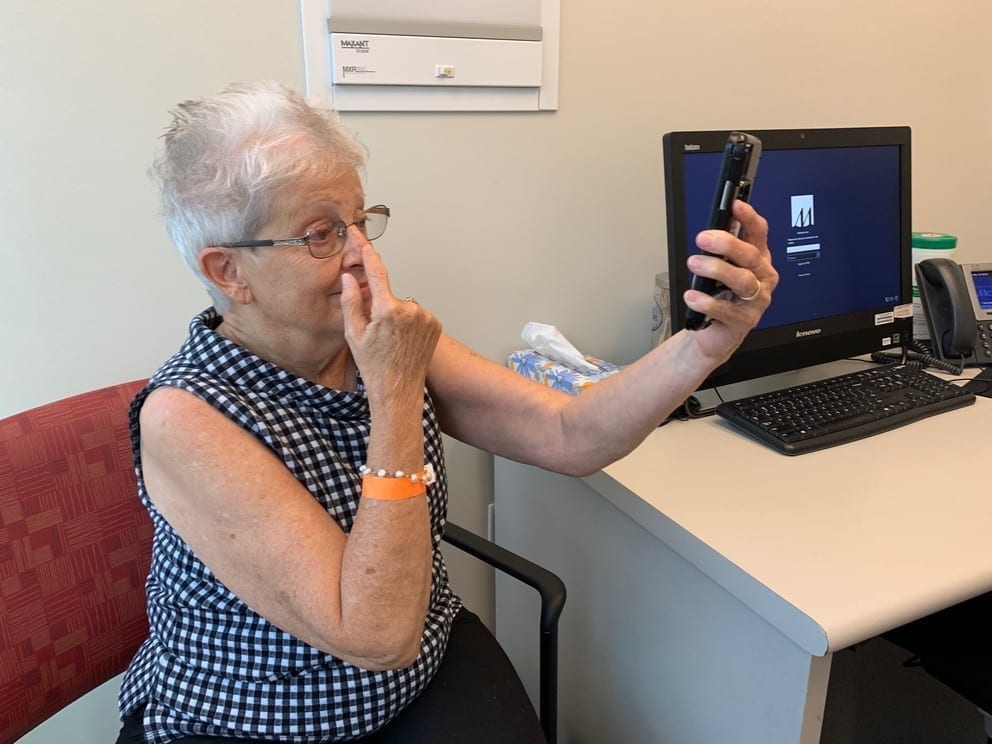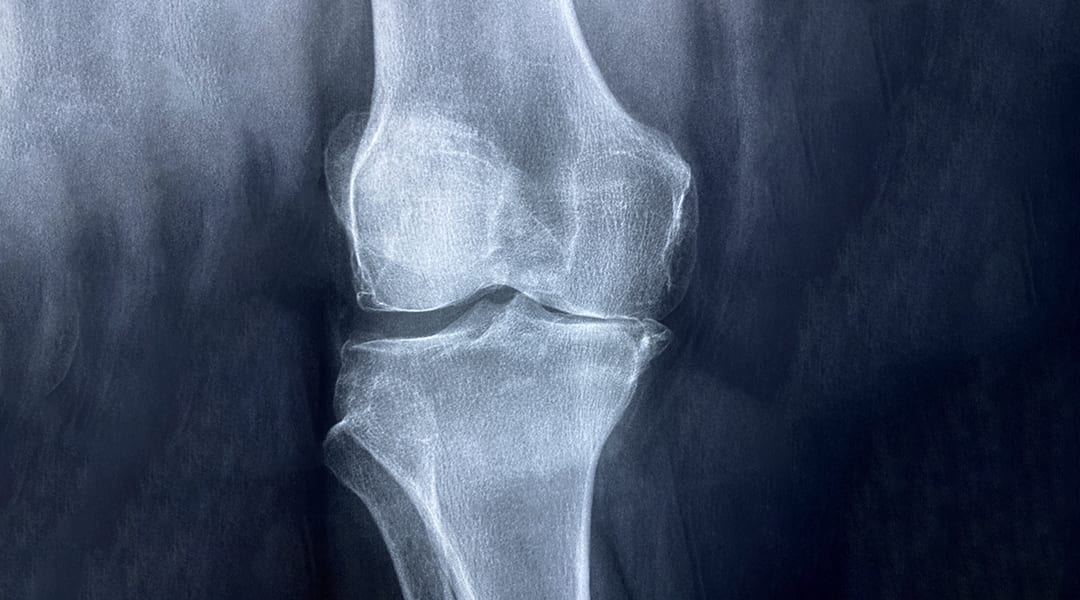
In the Alzheimer’s disease brain, the amyloid beta peptide clumps together to form hardened plaques between nerve cells.
University of South Florida Health neuroscientist suggests the therapeutic immunomodulatory vaccine may be safer for those with age-associated decline in immunity
Our immune system’s capacity to mount a well-regulated defense against foreign substances, including toxins, weakens with age and makes vaccines less effective in people over age 65. At the same time, research has shown that immunotherapy targeting neurotoxic forms of the peptide amyloid beta (oligomeric A?) may halt the progression of Alzheimer’s disease, the most common age-related neurodegenerative disease.
A team led by Chuanhai Cao, PhD, of the University of South Florida Health (USF Health), has focused on overcoming, in those with impaired immunity, excess inflammation and other complications that interfere with development of a therapeutic Alzheimer’s vaccine.
Now, a preclinical study by Dr. Cao and colleagues indicates that an antigen-presenting dendritic vaccine with a specific antibody response to oligomeric A? may be safer and offer clinical benefit in treating Alzheimer’s disease. The vaccine, called E22W42 DC, uses immune cells known as dendritic cells (DC) loaded with a modified A? peptide as the antigen.
The Alzheimer’s mouse model study of this new investigational vaccine was published early online Oct. 13 in the Journal of Alzheimer’s Disease.
One of the two hallmark pathologies of Alzheimer’s disease is hardened deposits of A? that clump together between nerve cells (amyloid protein plaques) in the brain; the other is neurofibrillary tangles of tau protein inside brain cells. Both lead to damaged neurological cell signaling, ultimately causing the onset of Alzheimer’s disease and symptoms.
“This therapeutic vaccine uses the body’s own immune cells to target the toxic A? molecules that accumulate harmfully in the brain,” said principal investigator Dr. Cao, a neuroscientist at the USF Health Taneja College of Pharmacy, USF Health Morsani College of Medicine and the university’s Byrd Alzheimer’s Center. “And, importantly, it provides strong immunomodulatory effects without inducing an unwanted, vaccine-associated autoimmune reaction in the aging mice.”
Unfortunately, clinical trials of all anti-amyloid treatments for Alzheimer’s disease so far have failed – including the initial vaccine trial targeting A? (AN-1792), which was suspended in 2002 after several immunized patients developed central nervous system inflammation. “Inflammation is a primary symptom of Alzheimer’s disease, so any possible treatment which has neural inflammation as a side effect essentially pours gas on the fire,” Dr. Cao said.
A next-generation anti-amyloid vaccine for Alzheimer’s would ideally produce long-lasting, moderate antibody levels needed to prevent A? oligomers from further aggregating into destructive Alzheimer’s plaques, without over-stimulating the immune systems of elderly people, Dr. Cao added.
In this study, the researchers tested the vaccine they formulated using modified A?-sensitized dendritic cells derived from mouse bone marrow. Dendritic cells interact with other immune cells (T-cells and B-cells) to help regulate immunity, including suppressing harmful responses against healthy tissues. “Because we use dendritic cells to generate antibodies, this vaccine can coordinate both innate and acquired immunity to potentially overcome age-related impairments of the immune system,” Dr. Cao said.
The study included three groups of transgenic (APP/PS1) mice genetically engineered to develop high levels of A? and behavioral/cognitive abnormalities that mimic human Alzheimer’s disease. One group was vaccinated with the investigational E22W42 DC vaccine, another received an endogenous amyloid beta peptide to stimulate dendritic cells (wild-type vaccine group), and the third was injected with dendritic cells only, containing no A? peptide (DC control group). A fourth group was comprised of untreated healthy, older mice (nontransgenic control group).
Among the study findings:
– The vaccine slowed memory impairment in the Alzheimer’s transgenic mice, with mice in the E22W42 DC vaccinated group demonstrating memory performance similar to that of the nontransgenic, untreated mice. In a cognitive test called a radial arm water maze, the E22W42 DC-vaccinated mice also showed significantly less errors in working memory than the mice injected with non-sensitized dendritic cells only (DC controls). Loss of working memory makes it difficult to learn and retain new information, a characteristic of Alzheimer’s disease.
– No significant differences were found in the quantities of inflammatory cytokines measured in the plasma of the vaccinated mice, versus amounts in the control mice. The researchers concluded that the E22W42 DC vaccine has “little potential for over priming the immune system.”
– E22W42 DC-vaccinated mice showed higher levels of anti-A? antibodies in both in their brain and in their blood than the transgenic control mice administered dendritic cells containing no modified A? peptide.
– Only A? peptides with mutations introduced in the T-cell epitope (the distinct surface region of the antigen where complementary antibodies bind) can sensitize the dendritic cells to target toxic oligomeric forms of A?, the researchers reported. A major advantage of E22W42 is that the antigen can stimulate a specific T-cell response that activates the immune system and silence some T-cell epitopes associated with an autoimmune response, they added.
“Though the E22W42-sensitized DC vaccine is being developed for patients with Alzheimer’s disease, it can potentially help strengthen the immune system of elderly patients (with other age-related disorders) as well,” the study authors concluded.
Dr. Cao conducted the study with collaborators from Tianjin University of Traditional Chinese Medicine and Michigan State University.
The Latest Updates from Bing News & Google News
Go deeper with Bing News on:
Alzheimer’s disease
- 'New' genetic Alzheimer's disease may impact 6.7 million Americans
An incredible new study has upended our understanding of genetic Alzheimer's disease, finding that nearly everyone carrying two copies of a culprit gene had distinct biological markers of the degenerative condition by the age of 65. This means the APOE4 ...
- How exactly does a high-fat diet increase Alzheimer's risk?
New research in mouse models of Alzheimer's disease suggests that a high-fat diet causes molecular changes that disrupt brain health.
Go deeper with Google Headlines on:
Alzheimer’s disease
[google_news title=”” keyword=”Alzheimer’s disease” num_posts=”5″ blurb_length=”0″ show_thumb=”left”]
Go deeper with Bing News on:
E22W42 DC
- Washington, DC 10-Day Weather Forecast
Thank you for reporting this station. We will review the data in question. You are about to report this weather station for bad data. Please select the information that is incorrect.
- Washington DC
As the US expanded west, some of its citizens called for removal of the capital out of Washington DC. The most popular city to host the capital? St. Louis, MO. 5×5 Temporary Public Art Project ...
- Dakota Gold Corp DC
Morningstar Quantitative Ratings for Stocks are generated using an algorithm that compares companies that are not under analyst coverage to peer companies that do receive analyst-driven ratings ...
- How to watch DC movies in order
Watching DC movies in release order is a pretty straightforward process, but things get a bit more complicated if you want to see them in chronological order. For this guide, we're focusing on the ...
- DC, Amtrak Police investigate stabbing at Union Station involving juveniles
dead and 2 injured after separate shootings across DC Amtrak officials said they are working with the Metropolitan Police Department (MPD) to investigate the incident. According to a social media ...
Go deeper with Google Headlines on:
E22W42 DC
[google_news title=”” keyword=”E22W42 DC” num_posts=”5″ blurb_length=”0″ show_thumb=”left”]










